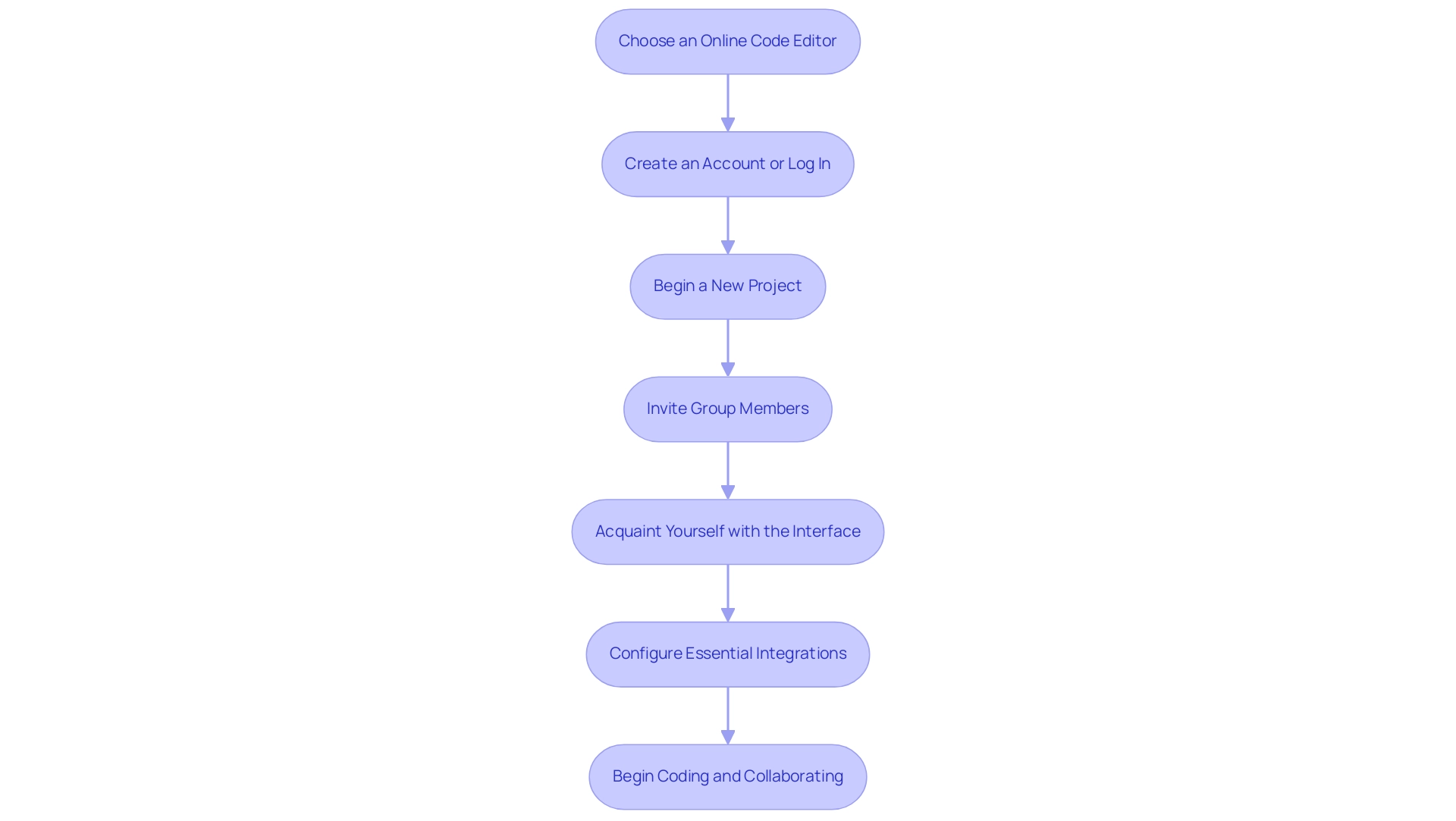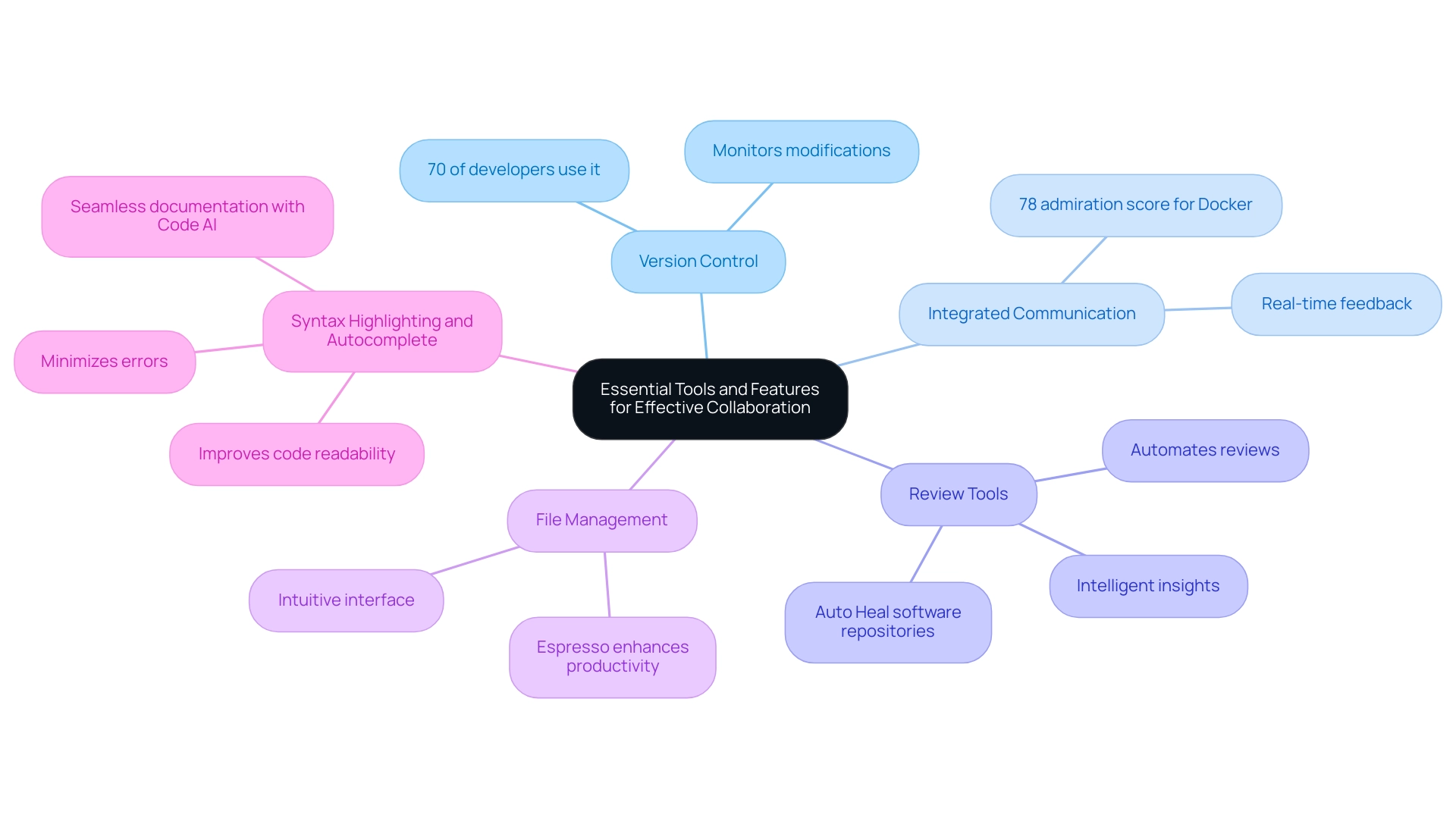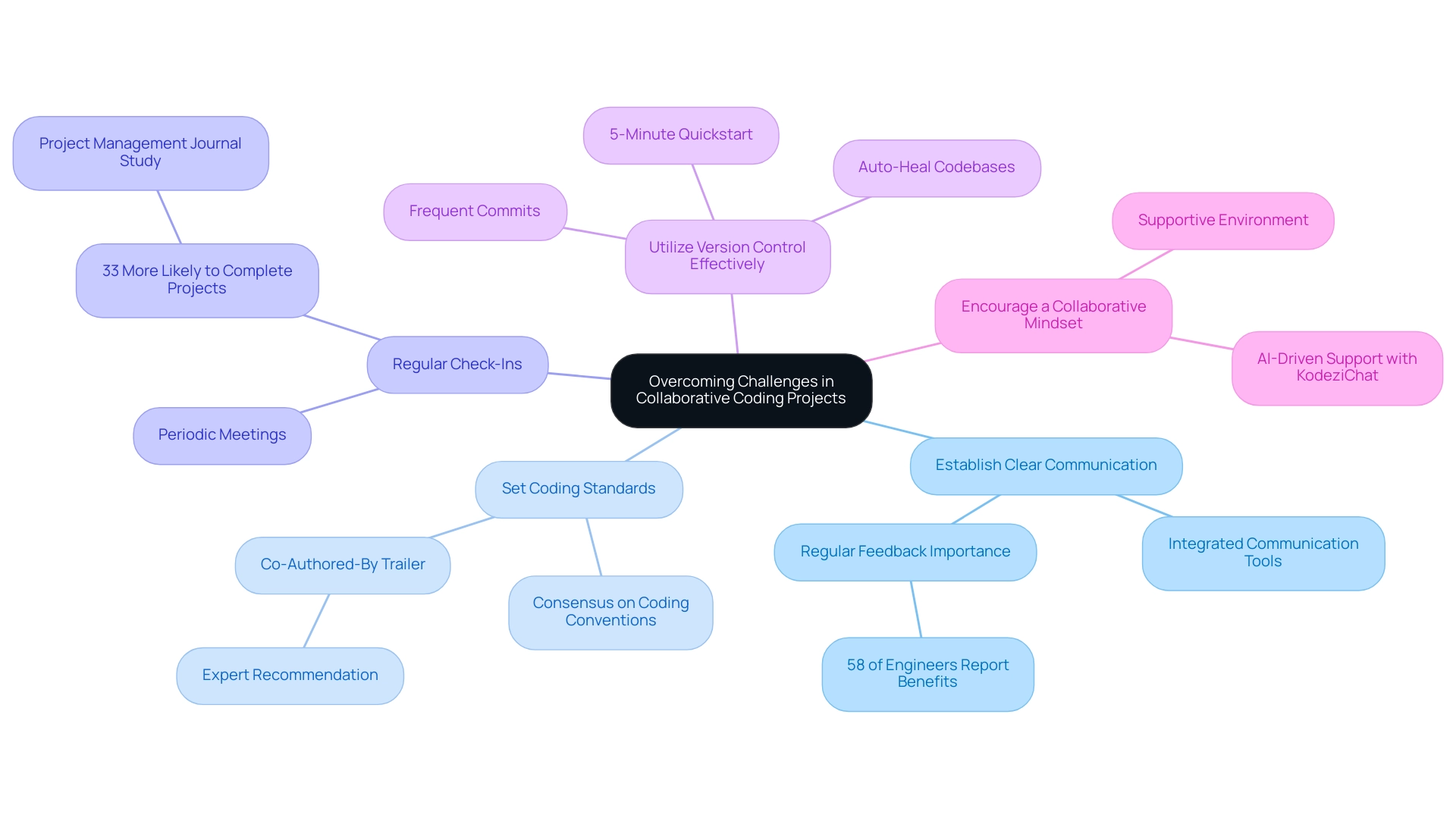Overview
The article provides a comprehensive step-by-step guide on utilizing online code editors for collaborative projects, emphasizing the importance of features like real-time collaboration, version control, and integrated communication tools. It supports this by detailing how these functionalities enhance productivity and project outcomes, highlighting statistics that show improved project completion rates and developer satisfaction when using these collaborative platforms.
Introduction
In a landscape where collaboration is paramount, online code editors have emerged as invaluable tools for teams striving to enhance productivity and streamline workflows. These platforms not only facilitate simultaneous coding efforts but also integrate powerful features that transform the coding experience.
With the introduction of solutions like Kodezi, developers can leverage real-time collaboration, automated debugging, and intelligent code management, ensuring that projects progress smoothly even in the face of complex challenges.
As the demand for effective teamwork continues to rise, understanding the essential tools and strategies for successful collaborative coding becomes crucial. This article delves into the world of online code editors, exploring their benefits, setup processes, and the key features that can elevate team performance to new heights.
Understanding Online Code Editors: A Collaborative Approach
Online code editors collaborative are powerful web-based platforms designed for simultaneous code writing and editing by multiple users. Furnished with vital characteristics like real-time collaboration, version control, and integrated communication resources, the online code editor collaborative tools are exceptionally suited for group projects. By integrating tools like CLI, often referred to as the Swiss-Army Knife for programmers, teams can auto-heal their codebases in seconds, eliminating the time wasted on pull requests and significantly enhancing productivity.
This online code editor collaborative environment not only fosters a unified understanding of the codebase but also enhances quality and accelerates problem-solving through automated reviews and debugging. Kodezi's automated debugging functionalities, such as:
- fixing performance bottlenecks
- finding security issues
- adding exception handling
- enhancing code formatting
play a crucial role in efficient code management. Recent statistics reveal that 62% of developers are utilizing AI resources this year, a notable increase from 44% last year, underscoring the growing reliance on collaborative coding practices.
Furthermore, platforms like Jira and Confluence have retained their position as the most favored asynchronous resources among developers for the third consecutive year, reflecting the consistent demand for effective project management and collaboration solutions. Notably, the AI-driven capabilities of this platform ensure performance optimization and security compliance, with 59% of professional developers using Docker and 45% of novices favoring npm, highlighting the importance of integrating various tools to enhance productivity. Moreover, KodeziChat enables quick programming question resolution and problem solving, further enhancing groups.
Low-code solutions enable companies to avoid hiring two software developers, saving them an estimated $4.4 million over three years. By utilizing an online code editor collaborative with the platform, teams can collaborate effortlessly across different locations, ultimately resulting in more efficient workflows and improved outcomes.
Step-by-Step Guide to Setting Up Your Online Code Editor
- Choose an online code editor collaborative that aligns with your project objectives, such as Replit or CodeSandbox, known for their powerful features, including intelligent suggestions and rapid corrections.
- Create an account or log in if you have an existing one to unlock full functionality. For Kodezi, fill out the sign-up form with your First Name, Last Name, Email Address, and Password, or opt for a quick sign-up using your Google account. By signing up, you agree to our Terms and Privacy Policy, ensuring that your data is secure and will never be shared.
- Begin a new project by selecting the appropriate programming language and framework, utilizing the editor's intelligent suggestions for optimal setup and employing advanced code completion and refactoring features that improve coding efficiency.
- Invite group members by sharing the project link or sending invitations via email to foster collaborative development in the online code editor collaborative.
- Acquaint yourself with the interface, focusing on the coding area, file management, and collaboration tools to enhance productivity.
- Configure any essential integrations, such as GitHub for version control and Slack for seamless communication, ensuring a cohesive workflow.
- Begin coding and collaborating with your group in real-time using an online code editor collaborative like Kodezi, which features rapid correction tools that automatically analyze and resolve bugs while significantly enhancing your programming efficiency through immediate feedback and suggestions.

Leveraging Real-Time Collaboration Features for Team Success
Real-time collaboration features in an online code editor collaborative are essential for fostering a productive coding environment, enabling members to observe each other's changes instantaneously. This capability significantly mitigates conflict risks and enhances overall communication. Introducing functionalities like live chat, comments, and reviews encourages open conversations regarding modifications, fostering an environment where colleagues feel empowered to ask questions and provide prompt feedback.
This collaborative culture, supported by an online code editor collaborative, not only fosters higher-quality code but also aligns with findings that indicate collaborative groups are 33% more likely to complete projects on time. Furthermore, the Standish Group highlights that real-time collaboration resources can lead to a 20% increase in customer satisfaction, showcasing their significance in delivering results. The CLI, often referred to as the Swiss-Army Knife for programmers, enhances this collaboration by auto-healing codebases swiftly, allowing teams to focus on productive coding rather than time-consuming pull requests.
However, enterprises face challenges in adopting these collaboration tools, as highlighted in the case study 'Challenges in the Adoption of Collaboration Software Solutions.' The study reveals that:
- 58% of enterprises identify risk assessment as a key security function for managing communications
- 64% face difficulties integrating technologies from various vendors
To address these challenges, it is crucial to leverage specific technologies such as WebSockets, MQTT, SignalR, and gRPC, which have been shown to enhance real-time collaboration in an online code editor collaborative environment.
Furthermore, the automated code debugging capabilities of the system enable instant identification and resolution of issues, ensuring that code quality remains high while also optimizing performance and ensuring security compliance. To maintain project momentum, utilizing version control features is also crucial, enabling groups to track changes and revert to earlier versions if needed. By embracing these practices and resources, including the advanced features of Kodezi, teams can ensure that their projects remain aligned with goals and deadlines, ultimately driving efficiency and enhancing output quality.
Furthermore, offering trustworthy guidance on these resources can assist users in making informed buying choices, further enhancing their collaborative efforts.
Essential Tools and Features for Effective Collaboration
When selecting an online code editor collaborative, it is essential to prioritize features that promote collaboration and boost productivity. Essential resources to consider include:
- Version Control: This feature allows group members to monitor modifications, manage different versions, and collaborate smoothly without the risk of overwriting one another’s work. Statistics indicate that version control is becoming increasingly vital, with over 70% of developers reporting its use in collaborative projects, highlighting its importance in the coding landscape.
- Integrated Communication: Tools such as chat windows or comment sections foster quick and efficient communication among team members, ensuring that questions and feedback can be addressed in real time. An example of a tool that excels in this area is Docker, which has achieved a 78% admiration score among developers for its collaborative features, making it the most desired tool for the second year in a row.
- Review Tools: Essential for facilitating peer reviews and providing constructive feedback, these tools help maintain high quality throughout the development process. Kodezi CLI, for example, not only automates reviews but also enhances management of the codebase through intelligent insights into problems and solutions. Moreover, its distinctive ability to Auto Heal software repositories enables groups to swiftly resolve issues, enhancing efficiency.
- File Management: An intuitive interface for navigating and organizing files permits members to find and modify scripts effectively, optimizing the workflow. Espresso’s features, for instance, significantly enhance file management and boost productivity for programmers.
- Syntax Highlighting and Autocomplete: These features improve code readability and accelerate the coding process by minimizing errors and enhancing overall efficiency. With the Code AI assistant, documentation becomes seamless, helping teams to maintain clarity and productivity.
Moreover, ensuring that your codebase follows the latest security best practices and coding standards is essential for maintaining high-quality software. Comprehending and employing these resources, particularly those provided by the platform, will greatly enhance your experience with the online code editor collaborative, driving results and maximizing productivity.

Overcoming Challenges in Collaborative Coding Projects
Collaborative coding projects can benefit from using an online code editor collaborative, although they often encounter significant challenges, including miscommunication, conflicting code changes, and varying coding styles. To effectively navigate these hurdles and enhance productivity with tools such as CLI, consider the following strategies:
- Establish Clear Communication: Implement integrated communication tools that facilitate real-time discussions, ensuring all members are aligned and informed. Data indicates that 58% of software engineers report that regular feedback from end-users helps in the early identification of potential hurdles, emphasizing the need for open lines of communication.
- Set Coding Standards: Develop consensus on coding conventions and best practices, which is crucial for maintaining consistency across the codebase, minimizing errors, and easing integration. As noted by an OpenStack expert, adopting practices like the 'Co-Authored-By' trailer in each commit reinforces collaborative contributions and helps manage complex, interdependent patches that require teamwork. The CLI, the Swiss-Army Knife for programmers, further enhances this by autonomously improving codebases, allowing groups to focus on innovation rather than correction.
- Regular Check-Ins: Schedule periodic meetings to assess progress, address challenges, and outline next steps. This alignment ensures that everyone is on the same page and can collaboratively tackle any emerging issues through an online code editor collaborative. A study published in the Project Management Journal highlighted that teams utilizing an online code editor collaborative are 33% more likely to complete projects on time, underscoring the importance of effective collaboration. With this tool, groups can also swiftly address coding inquiries, simplifying these discussions.
- Utilize Version Control Effectively: Encourage frequent commits from members and clear communication regarding significant changes. This proactive approach helps to prevent conflicts and streamlines integration. The integration of version control practices is essential for managing contributions from multiple developers. The CLI’s ability to auto-heal codebases means that common issues can be resolved automatically, reducing the need for extensive manual oversight. Additionally, with the 5-minute quickstart, groups can get up and running swiftly without wasting time on pull requests.
- Encourage a Collaborative Mindset: Create a supportive environment where members feel comfortable sharing ideas and seeking assistance. This atmosphere not only enhances teamwork but also significantly improves project outcomes. With KodeziChat, groups can benefit from AI-driven support for rapid coding question resolution, fostering a culture of collaboration. Don’t forget to check out the demo to see Kodezi in action! By adopting the strategies outlined above and leveraging an online code editor collaborative along with tools like Kodezi CLI and KodeziChat, coding teams can mitigate miscommunication and maximize their efficiency, ultimately leading to more successful project completions.

Conclusion
The exploration of online code editors reveals their transformative potential for collaborative coding environments. By enabling real-time collaboration and integrating essential features such as version control and automated debugging, tools like Kodezi empower teams to work seamlessly, enhancing productivity and code quality. The ability to address issues instantly and foster communication among team members contributes significantly to project success, as collaborative teams are statistically more likely to meet deadlines and achieve higher customer satisfaction.
Emphasizing the importance of strategic implementation, selecting the right tools, and establishing clear communication practices can effectively overcome common challenges in collaborative coding. By adopting a culture that prioritizes collaboration and leveraging advanced features such as Kodezi's auto-heal capabilities, teams can not only streamline their workflows but also focus on innovation and problem-solving.
Ultimately, the integration of online code editors into development processes is not just a trend; it is a necessity for teams aiming to thrive in a competitive landscape. By embracing these collaborative tools, teams can unlock their full potential, leading to more efficient coding practices and superior project outcomes. The future of coding lies in collaboration, and with tools like Kodezi at their disposal, teams are well-equipped to navigate the complexities of modern software development.
Frequently Asked Questions
What are online code editors collaborative?
Online code editors collaborative are web-based platforms that allow multiple users to write and edit code simultaneously. They include features like real-time collaboration, version control, and integrated communication tools, making them ideal for group projects.
How do online code editors enhance productivity?
They enhance productivity by integrating tools like CLI for quick codebase maintenance, automating reviews and debugging, and providing features that streamline collaboration, thereby reducing time wasted on pull requests.
What automated debugging functionalities does Kodezi offer?
Kodezi offers automated debugging functionalities that include fixing performance bottlenecks, finding security issues, adding exception handling, and enhancing code formatting.
What is the significance of AI in collaborative coding practices?
The use of AI in collaborative coding practices is growing, with 62% of developers utilizing AI resources this year, up from 44% last year. AI helps optimize performance and ensure security compliance in coding environments.
What platforms are popular for asynchronous collaboration among developers?
Platforms like Jira and Confluence have been favored by developers for asynchronous collaboration for three consecutive years, indicating a strong demand for effective project management solutions.
How do low-code solutions impact hiring and costs?
Low-code solutions can help companies avoid hiring two software developers, potentially saving them an estimated $4.4 million over three years.
What are the steps to start using an online code editor collaborative?
The steps include choosing an appropriate online code editor, creating an account, starting a new project, inviting group members, familiarizing yourself with the interface, configuring essential integrations, and beginning collaborative coding in real-time.
How can group members collaborate using an online code editor?
Group members can collaborate by sharing the project link or sending invitations via email, allowing them to work together in real-time using the online code editor's features.




